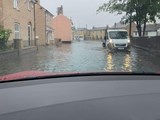Prepare, respond and recover
The work of the Local Resilience Forum is focused on:
- Saving lives
- Relieving suffering
- Protecting property
- Preventing further damage to the environment
- Preventing the impacts of a disaster getting worse
- Restoring normality as quickly as possible

Local Resilience Forums are directed by the Civil Contingencies Act (2004).
The act imposes a clear set of roles and responsibilities on the emergency responders and supporting agencies within the forum, to ensure emergencies are dealt with efficiently and effectively.
The Civil Contingencies Act
In summary, the Civil Contingencies Act 2004 requires Local Resilience Forums to:
- Assess the risk of emergencies occurring and use this to inform contingency planning
- Develop a Community Risk Register
- Put emergency plans in place
- Create business continuity plans so that critical functions can continue in an emergency
- Warn, inform and advise the public in the event of an emergency
- Make information about civil protection matters available to the public
- Share information and cooperate with other local responders to ensure a co-ordinated response
- Provide advice and assistance to businesses and voluntary organisations about business continuity management
The Community Risk Register
The Community Risk Register aims to inform you about the highest risks in Cambridgeshire and Peterborough and their potential impact and provide you with measures that can be taken to become better prepared in your home, business and community.
While certain risks are mentioned, it does not mean that they will definitely occur: it means there is a possibility that such incidents may happen, and agencies in the forum must have plans in place to respond if they do.

This is what we do to prepare for, respond to and recover from a major emergency, but there are also things you can do.
Being aware of the risks and potential consequences and putting measures in place to reduce the impact on you, your family, your home, your business and your community, will benefit everyone.
Getting prepared
Emergencies happen every day in the UK.
They can be caused by severe weather or other natural hazards, by deliberate actions, or as a result of accidents or infrastructure failure.
Here are a few simple steps you should consider taking to prepare for emergencies and the disruption they cause.
- Be informed - find out about our local risks in our community risk register and follow advice on what to do before, during and after an emergency.
- Sign up for alerts and warnings
- Learn basic first aid
- Prepare your home - know how to turn off your water, electricity and gas supply, check your fire alarms once a month, complete a home emergency plan, complete an online home fire safety check
- If you live in a flood risk area, find out more actions you can take to prepare your property.
- Get emergency supplies - prepare an emeregency pack
- There's lots of other helpful advice, tips, useful links and contact numbers on this website to help you prepare for emeregencies
Use the navigation tools to find out what you can do to prepare your family, your home, your business and your community.
